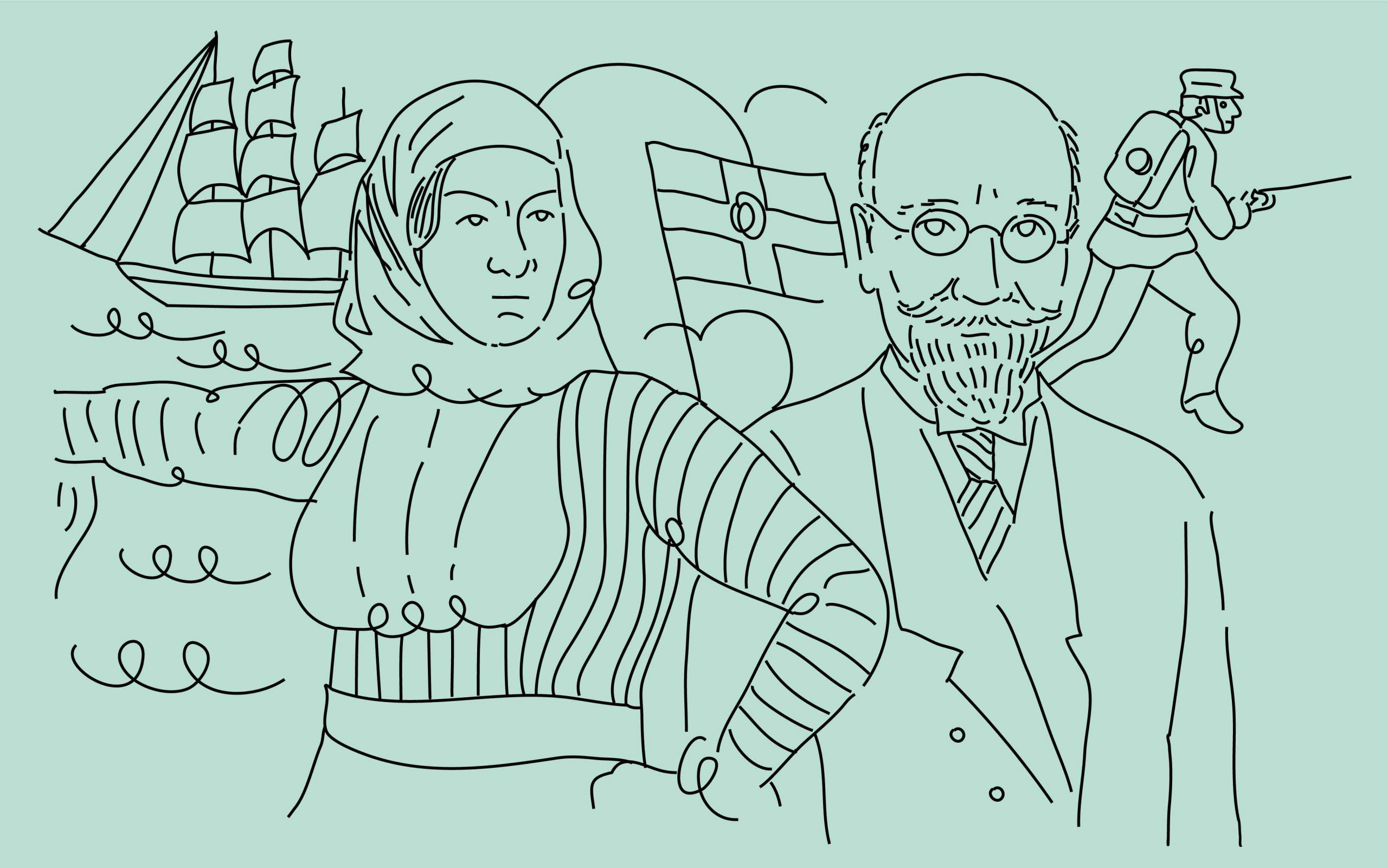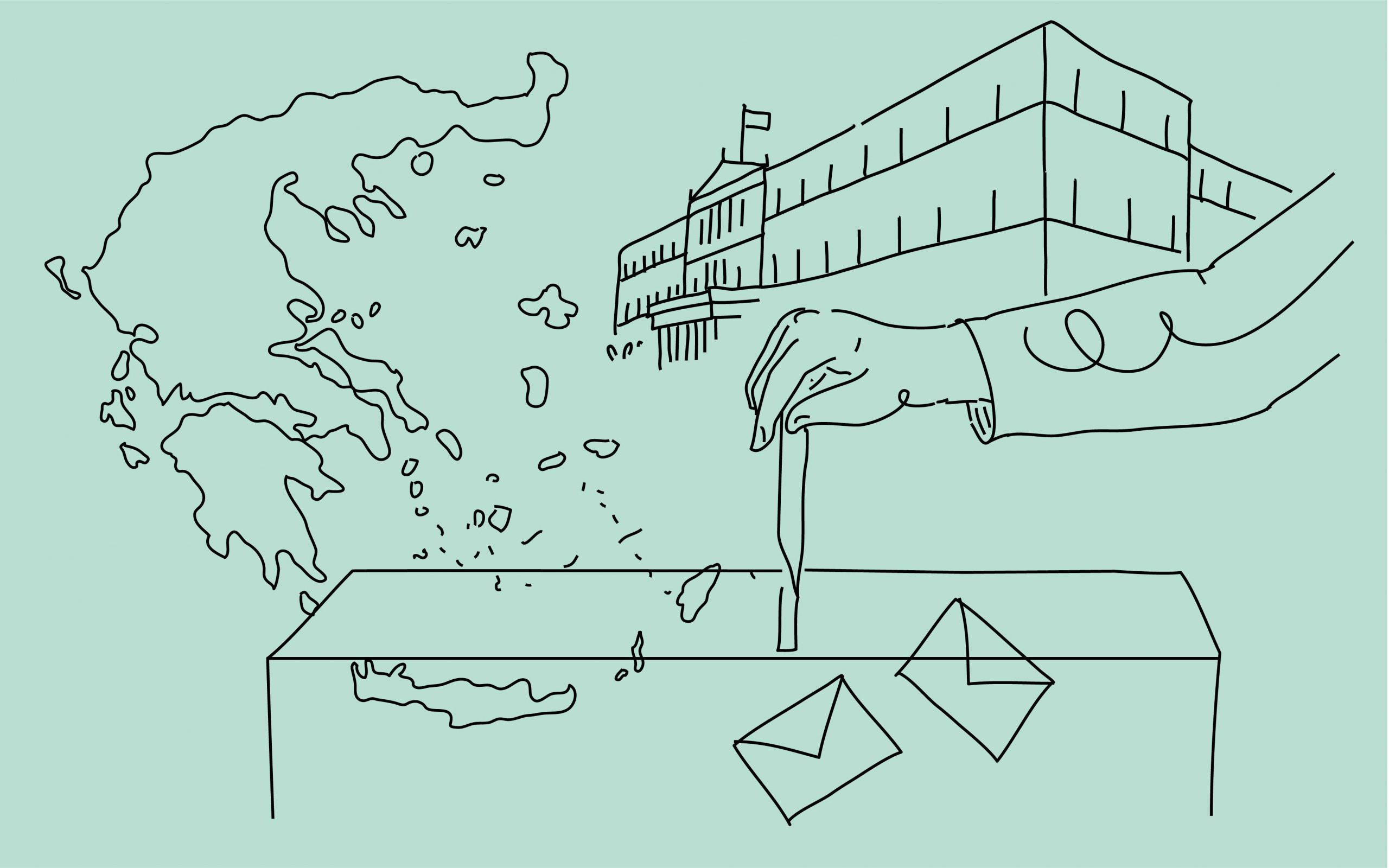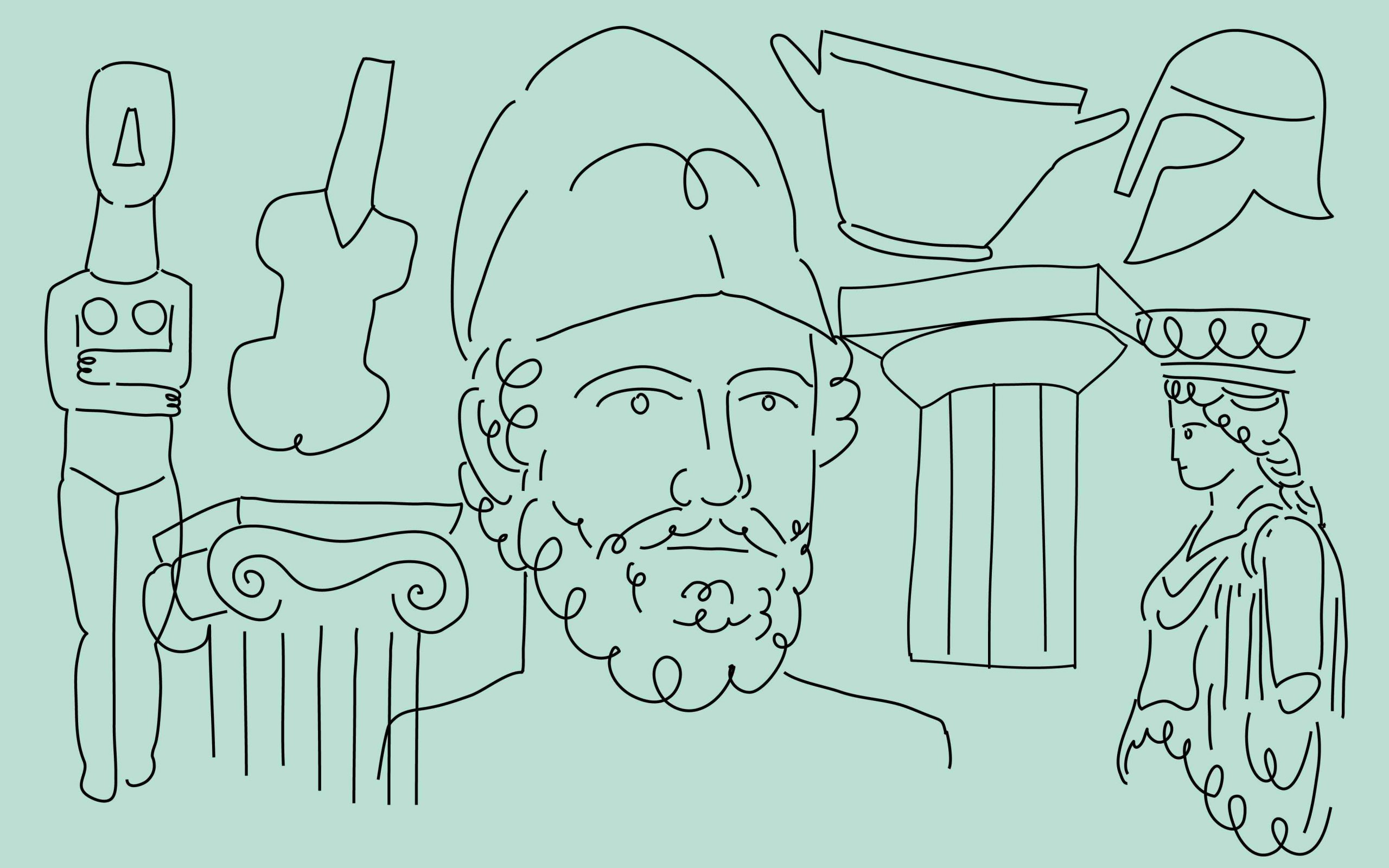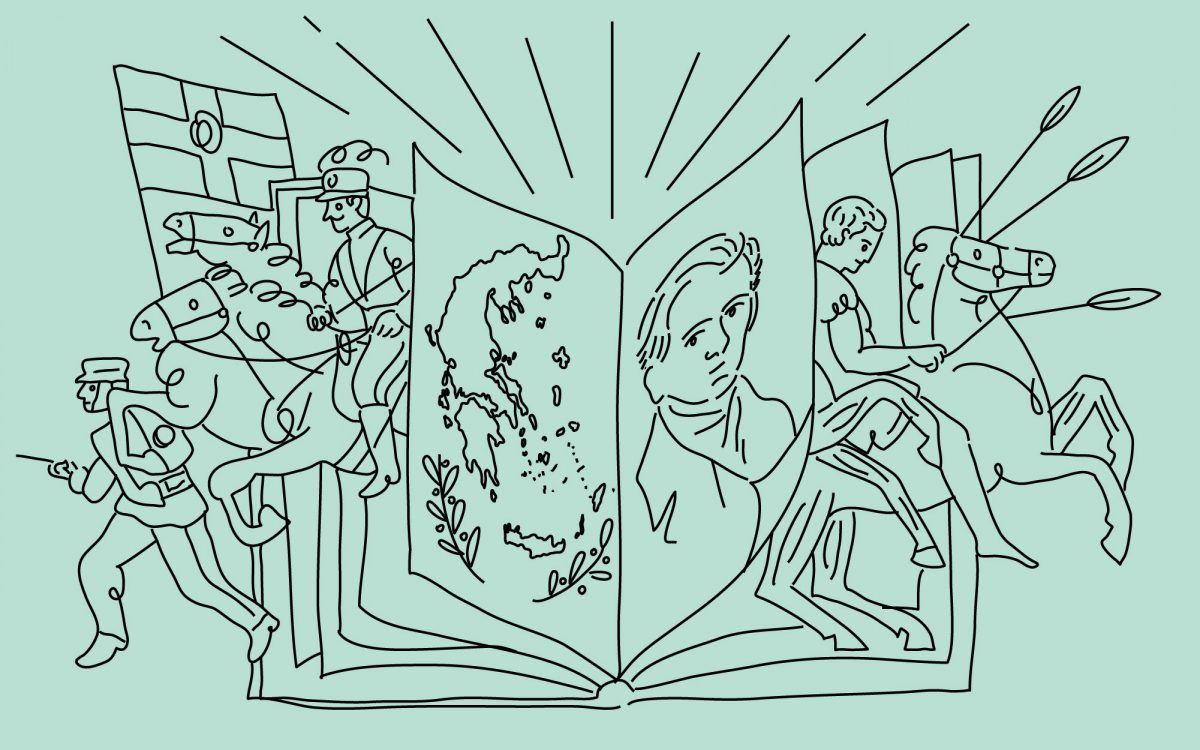Passing the Greek Citizenship Test (the Π.Ε.Γ.Π. – “Certificate of Knowledge Proficiency Examinations for Naturalization”) is more than a matter of diligence; it’s about becoming Greek. The exam demands a profound familiarity with every aspect of Greek identity: history, geography, culture and tradition, and the complexities of government. It’s a detailed overview of everything from the colonization of Magna Grecia in the 1st millennium BC through whether or not folk singer Eleftheria Arvanitaki performed with Opisthodromiki Kompania (she did). In short, you don’t need Greek blood to become a citizen, but you do need a Greek soul.
Did preparing for the exam make me fall even harder for Greece more? In the main, yes. But besides a Greek soul, you also need to have a huge amount of stamina to withstand the many opaque questions not central to meaningful engagement with Greek society.
What the Exam Covers
Millennia of a history gripping at every turn make for good material. So does a famously captivating geography. Culture covers the ancient world and the present, the sacred and the secular. The section on political institutions is unsurprisingly Byzantine.
In addition to history, geography, culture, and political institutions, the written exam includes reading comprehension and grammar. You’ll need to write an essay, too. Listening comprehension is two short passages, usually a dialogue, with five questions on each. There’s a mix of questions – True or False (T/F), multiple choice, supply missing words (sometimes provided, sometimes not), or give a short list. A few of the questions in history and in political institutions sections require a short paragraph.
Preparation materials
At this link you’ll find downloadable files of all of the questions and all of the answers for the March 2023 exam, including 100 long form texts and the audio recordings, both with their related questions. Similar files should appear for the new exam. I gathered from candidates who had taken the exam more than once that the pool of questions is largely the same.

© Illustration: Philippos Avramides
Geography
What’s not to like? Fabled mountains, rivers, lakes, several seas, and groups of islands of thrilling variety are a joy to study.
Having said that, the section is not easy. You need to know the country thoroughly – the chief areas of agricultural production and of industry, the least and most densely populated regions, the 51 prefectures, their capitals, and to which of the 13 regional units they belong. Which border the sea and which are landlocked? You might, for instance, need to identify on a blank map the prefectures of Lassithi, Arkadia, and Pella, and include the locations in each of them of two towns which are not the capitals, or name the capitals of the old prefectures en route from Mouzaki near Karditsa to Chalkida in Evia.
Greece’s land and sea borders and the southernmost (Gavdos, off of Crete), easternmost (it’s called Megisti on the exam, but many of us know it as Kastellorizo), and westernmost (Othoni) islands are included, as well as its northern borders. Besides identifying mountains, lakes, and rivers, the Corinth Canal, and the Rio-Antirio bridge, you’ll want to know the country’s chief agricultural products and main energy source. You’ll get to know all of the islands backwards, which is a treat.

© Illustration: Philippos Avramides
Highlights of Greek History
This is where the exam shines. Over the course of 80 questions, eras and events take on shape and relevance, from the first colonization period (10th millennium BC) through the Peloponnesian wars, Roman and Byzantine eras, Ottoman Occupation, Balkan Wars, Asia Minor Catastrophe and population exchange, WWII occupation, and the military dictatorship. While some questions were more obscure than others, they all add value to the candidate’s understanding of Greek history.
Great protagonists throughout the ages appear, including the various statesmen of ancient Greece (Kleisthenes, who introduced “Ostracismos” – ostracism, where by vote those deemed dangerous to democracy could be exiled from the city), Byzantine emperors (the last was Constantinos Paleologos XI), heroes and heroines (such as Laskarina Bouboulina, Greece’s celebrated female Naval captain and a hero of the revolution of 1821, and Manolis Glezos and Lakis Santas, who took the Nazi flag down from the Acropolis during the occupation), writers and revolutionaries (Rigas Velestinlis [Feraios], Athanasios Diakos, among many others), benefactors (Averoff), Philhellenes (Byron), and Prime Ministers (among them, Harilao Tripkoupi and Eleftherios Venizelos), and kings. Some, like Georgos Karaiskakis, you’ll need to identify from portraits or photographs.
Several questions require definitions of 50-80 words (in Greek), such as the anthemic expressions “Μολών Λαβέ” (“Molón Lavé” – “Come and get them” were Leonidas’ words to Xerxes when he demanded that the greatly outnumbered Spartans relinquish their weapons at the Battle of Thermopylae) and “Ελευθερία ή θάνατος” (Eleftheria i Thanatos – “freedom or death” – the proclamation of the revolution, emblazoned on revolutionary flags). Also events, such as the Στάση του Νίκα (the Nika Sedition, a revolt of 532 AD that began in the hippodrome of Constantinople at the chariot races) and the National Schism (the WWI division of Greece, with the Venizelists, based in Thessaloniki, on the side of Entente and the Royalists in the south supporting neutrality). You’ll need to describe the Seisacheia (Solon’s legal reforms that relieved debt and prohibited the serfdom and enslavement of debtors) and the Constitution of Epidaurus, among many other terms.
Candidates will need to distinguish between the “Dekemvriana” (the “December Events” were 1944 clashes in Athens between Greek communist factions and the Greek and British armies), the “Noemvriana” (the “November Events” of 1916 were royalist attacks on Venizelos supporters in Athens, after he had established the Provisional Government of National Defense in Thessaloniki) and the “Iouliana” (the 1965 “July Events” happened after king Constantine forced the resignation of Prime Minister Giorgos Papandreou. The ensuing unrest led to the military coup of 1967). Other key moments of history included the 17th of November (the uprising against the military dictatorship at Athens’ Polytechnic which culminated in the martial law and ultimately in the dictatorship’s demise). You’ll need to know “Μεγάλη Ελλάδα” (“Μegali Ellada” – Magna Grecia), and the “Μεγάλη Ιδέα” (the “Great Idea” was the dream of extending the borders of Greece to encompass all areas historically Greek in the Balkans and Asia Minor).
There are many major battles – Elli, Isso, Sarantaoporou, Maniaki, and more. There are victories – like Marathon (Athens’ victory over the Persians, 490 BC), and losses, like Manzikert (the 1071 victory of the forces of the Seljuk empire over the Byzantine empire at Manzikert, an ultimately irretrievable reversal of fortune for the Byzantine empire).
Without a greater context, preparation would have been more difficult and much less satisfying. Modern history figures prominently. I had already read Modern Greece: What Everyone Needs to Know by Stahis Kalyvas (Oxford University Press, 2015) – a strong narrative that leads the reader from the nation’s birth through the eventful centuries that followed. I returned to it many times as I was preparing for the exam.

© Illustration: Philippos Avramides
Political Institutions
This section was grueling, yet illuminating
It covers the essentials of political engagement in meaningful detail – the composition of the current government, for instance. Also, the number of seats in Parliament (300), the minimum a party needs to in order to have Parliamentary representation (3%), the minimum a party needs to govern (151), and how these seats are allocated. Candidates need to know all of the parties currently present in Parliament, as well as all who participated in the last election.
However, some questions in this section seem intentionally obscure. Candidates should know the number of times the founding treaty of the body that is today the European Union has been revised since 1958 (five), for instance. There’s also question 14’s extraction from articles 13 and 14 the of the Κανονισμός της Βουλής – the Regulation of Parliament (the question doesn’t identify the source of the fragment):
“After the revision of the Constitution in 2001, the Conference of Presidents
by____or by a majority____designates the members of the Independent Authorities who are
provided for in the Constitution. By____or by majority ____ are chosen the ____,
the____and ____ members of the Statistical Authority and expresses____after____
for the selection of Judicial Functions in its leading positions of Justice.”
Some questions illuminate, and sometimes meaningfully reveal, Greek society and the rights and protections of citizens. For instance, artistic freedom is protected, discrimination based on religion is illegal, and your home is sovereign. Homosexual couples can enter into a cohabitation agreement, but not marry in a church ceremony. They may not adopt children, but they can become foster parents. Domestic violence is a crime, and marital rape is a felony. A man causing his pregnant wife physical harm during an argument can be sentenced to prison for a minimum of two years, and a woman can be imprisoned for up to two years for disparaging her husband with a particularly humiliating word or gesture regarding his sexual prowess.

© Illustration: Philippos Avramides
Culture
Culture gets off to a solid start, with gods and myths of ancient Greece and images to identify as Minoan, Mycenaean, Cycladic, Classical, and Hellenistic. You’ll also identify Byzantine and Neoclassical art and architecture.
Music also has nothing to complain about, with several questions covering Laïko (Λαϊκό), Rebetiko (Ρεμβέτικο), and Entechno (Έντεχνο). And could anyone become Greek without knowing who wrote the score for “Zorbas” or who wrote “Never on a Sunday”? From Maria Kallas to… Elena Paparizou (Greece’s “Number One” in Eurovision), this was a thorough section. Cinema has good representation, too. Who starred in “The Counterfeit Coin”? (“H Κάλπικη λίρα” – Elli Labetti and Dimitris Horn, who captured the heart of Edith Piaff), and who played the lead role in Cacoyiannis’ “Stella”? (If you’re not absolutely sure, you can visit the Metro stop Acropoli).
Questions on Athletics range from Spyros Louis (winner of the marathon at Greece’s first modern Olympics, 1896) to Nikos Gallis, instrumental in Greece’s 1987 EuroBasket cup victory.
However, the only painter who gets a mention is El Greco, and the only architects alluded to are Ictinus and Callicrates, by omission (“T/F – ‘The Architect of the Parthenon was Phideas”). Modern visual art and architecture are also nowhere – no Pikionis, no Tsarouchis, no Chryssa, nothing (with the exception of Zongolopoulos’ “Umbrellas” as one of four sculptures).
Reading Comprehension
The language level for the exam is supposed to be a B1, and for the reading section it is (but a B1 will not get you far with extractions of parliamentary documents, nor with much else for that matter).
A one-page essay is followed by a series of short questions on comprehension, vocabulary, and grammar. Then you write a very short essay (80-100 words) on a related topic, which is clearly defined.
Taking the Exam
Before the exam you’ll receive a message about your exam location. You need to arrive quite early, where you seal your cell phone into an envelope and leave it with the guard. Expect to wait a long time at your desk to begin (an hour, for us). Bring pens and some water. They gave us everything else we needed.
You’ll take an assigned seat long before the questions arrive. To ensure objectivity, after filling out your name and identification number on the exam books, the information is covered, to be removed only after the exam has been graded. The grades from the first reader and then the second reader are also covered in turn.
The time allotted for the 20 questions, reading comprehension and related 18 questions, and the essay is ample; many people left before the end.
You may mark on the exam itself, but only the answers transferred to the exam book count, as proctors often reminded us. The book opens to two maps for some of the geography questions. Another 18 questions follow. For us, that was two more on geography, four on culture, and six each on history and political institutions. There’s a mix of types – T/F, multiple choice, supply missing words (sometimes provided, sometimes not). The reading, comprehension, and essay follows directly, and we were able to portion our time as we wished.
How the Rest of the Exam Unfolds
We went into the school yard before listening section. You can’t get your phone back or leave the premises. The school snack bar was open for us, but bring plenty of water and a snack just in case.
Listening
There are two listening sections, with five questions each, either multiple choice or T/F. We got to hear each twice, with a brief pause in between. These are short, and clear, but the questions they can be surprisingly tricky – read them with care.
Speaking
Candidates enter the room in pairs and take turns, both remaining in the room the whole time. One examiner engages the candidate, and the other takes notes. They switched roles for each of us. The examiners were courteous and encouraging. They began with the questions like “How did you come to live in Greece?” and “Why do you want to be a Greek citizen?” In the room where I took the written exam, most of us had been here for over two decades, and some more than three. In that light, an honest answer would be: “To put an end to this bureaucratic indignity!” (Honesty is not required).
Candidates are given images to stimulate conversation. My exam companion had photos of hikers, and an action sport. I had art – the Caryatids in the Acropolis Museum, and the floor of the National Gallery, where the genre painting is.
From arrival to departure, the whole exam took about five hours.
How to Take the Citizenship Exam
The exam is given twice a year, but not on a set schedule (the one I took in March would ordinarily have been given in May). Anyone interested should visit the official site regularly. When the exam is announced, you can sign up by making a deposit of €150 through a link on the site. You’ll need your Taxisnet code. Registration closes well before the exam, making it easy to miss the sign up window
Passing the Exam
This is not a competitive exam; all of the candidates could in theory pass. You need a minimum overall score of 70%; on the language sections you’ll need at least 40/60, and on the topics 20/40.
Who’s Taking the Exam
Most of the candidates seemed to be over forty, some were over fifty or sixty (exams by candidates over 62 are scored with more leeway – check on the official site). Some I spoke with had been here for two decades, or even three. Many were repeating the exam, like the man next to me who had failed every exam given since its introduction in May of 2021; the exam fee each time amounts to three to four day’s wages for many jobs.
The piece by Paschos Mandravelis: “The New Greek Citizenship Test is All Greek to Everyone” with the clever title underscores the irrelevance and opacity of some of the questions. It’s not surprising that many candidates fail; between extractions from the official articles of parliamentary procedure, obscure acronyms, and the number of seats some of Greece’s political parties hold in the European parliament, there were many that graduates of Greek university weren’t able to answer for me. Remarks from employees of the department of immigration were unexpectedly revealing: “If you pass, you’ll know more about Greece than we do.”
Considering that candidates are expected to know more than Greek university graduates and also more than civil servants who represent the body requiring the exam, and given the sheer volume of material, the citizenship exam seems designed to exclude. I went into the exam with two huge advantages: I read and write about Greece for a living, and I can afford to devote a full month to nothing but study. Other candidates, certainly all I spoke to, had inflexible and sometimes physically demanding jobs. Hopefully this inequity can be addressed, with future exams made more inclusive with approachable, relevant material that inspires candidates to embrace Greek society, rather than be further intimidated by it.
For everyone I spoke to, the exam was yet another obstacle after sometimes decades of contribution to Greek society without the sense of dignity and security that citizenship confers. It’s an often demeaning quest; Marianna Kakaounaki’s “Why are you so hell-bent on becoming Greek?” expresses the experience of many.
So, on the other hand, perhaps none of it matters much; in the words of the woman next to me, fluent in four languages in addition to Greek and here over 20 years, and taking the exam the second time: “And if we get citizenship, are they going to see us any differently?”












